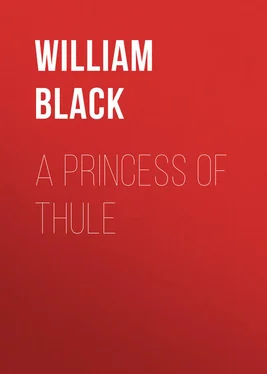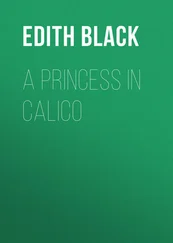William Black - A Princess of Thule
Здесь есть возможность читать онлайн «William Black - A Princess of Thule» — ознакомительный отрывок электронной книги совершенно бесплатно, а после прочтения отрывка купить полную версию. В некоторых случаях можно слушать аудио, скачать через торрент в формате fb2 и присутствует краткое содержание. Жанр: foreign_antique, foreign_prose, на английском языке. Описание произведения, (предисловие) а так же отзывы посетителей доступны на портале библиотеки ЛибКат.
- Название:A Princess of Thule
- Автор:
- Жанр:
- Год:неизвестен
- ISBN:нет данных
- Рейтинг книги:3 / 5. Голосов: 1
-
Избранное:Добавить в избранное
- Отзывы:
-
Ваша оценка:
- 60
- 1
- 2
- 3
- 4
- 5
A Princess of Thule: краткое содержание, описание и аннотация
Предлагаем к чтению аннотацию, описание, краткое содержание или предисловие (зависит от того, что написал сам автор книги «A Princess of Thule»). Если вы не нашли необходимую информацию о книге — напишите в комментариях, мы постараемся отыскать её.
A Princess of Thule — читать онлайн ознакомительный отрывок
Ниже представлен текст книги, разбитый по страницам. Система сохранения места последней прочитанной страницы, позволяет с удобством читать онлайн бесплатно книгу «A Princess of Thule», без необходимости каждый раз заново искать на чём Вы остановились. Поставьте закладку, и сможете в любой момент перейти на страницу, на которой закончили чтение.
Интервал:
Закладка:
The girl looked up with some surprise: “That is the work I have to do. My papa cannot do everything in the island.”
“But what is the necessity for your bothering yourself about such things? Surely they ought to be able to look after their own gardens and houses. It is no degradation – certainly not; for anything you interested yourself in would become worthy of attention by the very fact – but, after all, it seems such a pity you should give up your time to these commonplace details.”
“But some one must do it,” said the girl, quite innocently, “and my papa has no time. And they will be very good in doing what I ask them – everyone in the island.”
Was this a willful affectation? he said to himself. Or was she really incapable of understanding that there was anything incongruous in a young lady of her position, education and refinement busying herself with the curing of fish and the cost of lime? He had himself marked the incongruity long ago, when Ingram had been telling him of the remote and beautiful maiden whose only notions of the world had been derived from literature – who was more familiar with the magic land in which Endymion wandered than with any other – and that at the same time she was about as good as her father at planning a wooden bridge over a stream. When Lavender had got outside again – when he found himself walking with her along the white beach in front of the blue Atlantic – she was again the princess of his dreams. He looked at her face, and he saw in her eyes that she must be familiar with all the romantic nooks and glades of English poetry. The plashing of the waves down there and the music of her voice recalled the sad legends of the fishermen he hoped to hear her sing. But ever and anon there occurred a jarring recollection – whether arising from a contradiction between his notion of Sheila and the actual Sheila, or whether from some incongruity in itself, he did not stop to consider. He only knew that a beautiful maiden who had lived by the sea all her life, and who had followed the wanderings of Endymion in the enchanted forest, need not have been so particular about a method of boiling potatoes, or have shown so much interest in a pattern for children’s frocks.
Mackenzie and Ingram met them. There was the usual “Well, Sheila?” followed by a thousand questions about the very things she had been inquiring into. That was one of the odd points about Ingram that puzzled and sometimes vexed Lavender; for if you are walking home at night it is inconvenient to be accompanied by a friend who would stop to ask about the circumstances of some old crone hobbling along the pavement, or who could, on his own door-step, stop to have a chat with a garrulous policeman. Ingram was about as odd as Sheila herself in the attention he paid to those wretched cotters and their doings. He could not advise on the important subject of broth, but he would have tasted it by way of discovery, even if it had been presented to him in a tea-cup. He had already been prowling around the place with Mackenzie. He had inspected the apparatus in the creek for hauling up the boats. He had visited the curing houses. He had examined the heaps of fish drying on the beach. He had drunk whisky with John the Piper and shaken hands with Alister-nan-Each. And now he had come to tell Sheila that the piper was bringing down luncheon from Mackenzie’s house, and that after they had eaten and drunk on the white beach they would put out the Maighdean-mhara once more to sea, and sail over to Mevaig, that the stranger might see the wondrous sands of the Bay of Uig.
But it was not in consonance with the dignity of a king that his guests should eat from off the pebbles, like so many fishermen, and when Mairi and another girl brought down the baskets, luncheon was placed in the stern of the small vessel, while Duncan got up the sails and put out from the stone quay. As for John the Piper, was he insulted for having been sent on a menial errand? They had scarcely got away from the shore when the sounds of the pipes were wafted to them from the hillside above, and it was the “Lament of Mackrimmon” that followed them out to sea:
Mackrimmon shall no more return,
Oh never, never more return!
That was the wild and ominous air that was skirling up on the hillside; and Mackenzie’s face, as he heard it, grew wroth. “That teffle of a piper, John!” he said, “will be playing Cha till mi tuiligh? ”
“It is out of mischief, papa,” said Sheila – “that is all.”
“It will be more than mischief if I burn his pipes and drive him out of Borva. Then there will be no more of mischief.”
“It is very bad of John to do that,” said Sheila to Lavender, apparently in explanation of her father’s anger, “for we have given him shelter here when there will be no more pipes in all the Lewis. It was the Free Church ministers, they put down the pipes, for there was too much wildness at the marriages when the pipes would play.”
“And what do the people dance to now?” asked the young gentleman, who seemed to resent this paternal government.
Sheila laughed in an embarrassed way.
“Miss Mackenzie would rather not tell you,” said Ingram. “The fact is, the noble mountaineers of these districts have had to fall back on the Jew’s harp. The ministers allow the instrument to be used – I suppose because there is a look of piety in the name. But the dancing doesn’t get very mad when you have two or three young fellows playing a strathspey on a bit of a trembling wire.”
“That teffle of a piper John!” growled Mackenzie, under his breath; and so the Maighdean-mhara lightly sped on her way, opening out the various headlands of the islands, until at last she got into the narrows by Eilean-Aird-Meinish, and ran up the long arm of the sea to Mevaig.
They landed and went up the rocks. They passed two or three small white houses overlooking the still, green waters of the sea, and then, following the line of a river, plunged into the heart of a strange and lonely district, in which there appeared to be no life. The river track took them up a green glen, the sides of which were about as sheer as a railway cutting. There were no trees or bushes about, but the green pasture along the bed of the valley wore its brightest colors in the warm sunlight, and far up on the hillsides the browns and crimsons of the heather and the silver gray of the rocks trembled in the white haze of the heat. Over that again the blue sky, as still and silent as the world below.
They wandered on, content with idleness and a fine day. Mr. Mackenzie was talking with some little loudness, so that Lavender might hear, of Mr. John Stuart Mill, and was anxious to convey to Ted Ingram that a wise man, who is responsible for the well-being of his fellow creatures, will study all sides of all questions, however dangerous. Sheila was doing her best to entertain the stranger, and he, in a dream of his own, was listening to the information she gave him. How much of it did he carry away? He was told that the gray goose built its nest in the rushes at the edge of lakes; Sheila knew several nests in Borva. Sheila also caught the young of the wild duck when the mother was guiding them down the hill-rivulets to the sea. She had tamed many of them, catching them thus before they could fly. The names of most of the mountains about here ended in bhal , which was a Gaelic corruption of the Norse fiall , a mountain. There were many Norse names all through the Lewis, but more particularly towards the Butt. The termination bost , for example, at the end of many words, meant an inhabited place, but she fancied bost was Danish. And did Mr. Lavender know of the legend connected with the air of Cha till, cha till mi tuille?
Читать дальшеИнтервал:
Закладка:
Похожие книги на «A Princess of Thule»
Представляем Вашему вниманию похожие книги на «A Princess of Thule» списком для выбора. Мы отобрали схожую по названию и смыслу литературу в надежде предоставить читателям больше вариантов отыскать новые, интересные, ещё непрочитанные произведения.
Обсуждение, отзывы о книге «A Princess of Thule» и просто собственные мнения читателей. Оставьте ваши комментарии, напишите, что Вы думаете о произведении, его смысле или главных героях. Укажите что конкретно понравилось, а что нет, и почему Вы так считаете.












